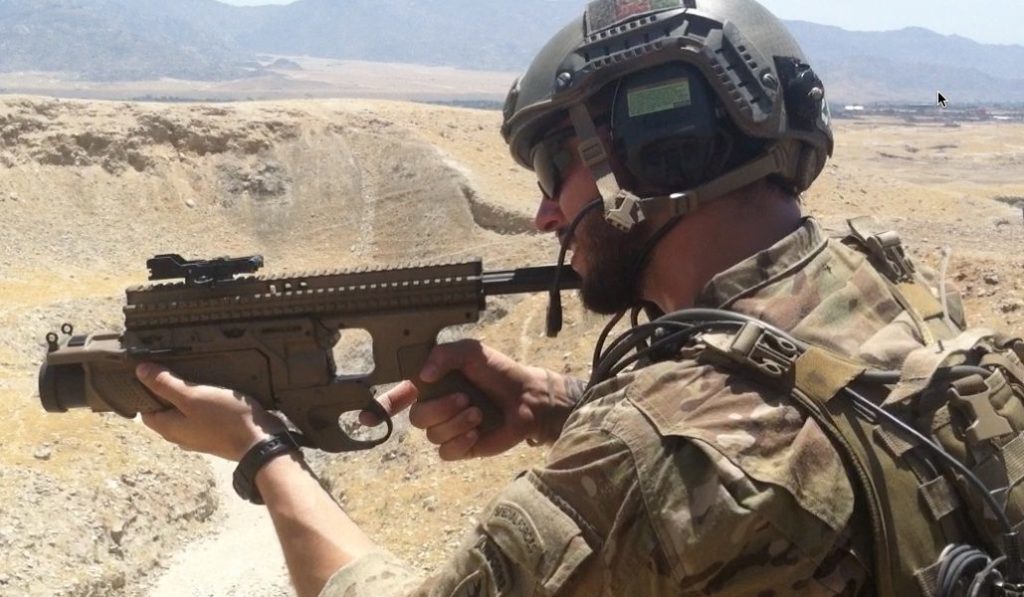Microsoft training helps a Green Beret become a service engineer
Adam Citterbart’s drive to protect his country and make the greatest use of his skills and talents led him to the U.S. Army Special Forces, better known as the Green Berets. When the time came to leave Special Forces and focus on protecting and providing for his family, Citterbart knew he’d need to do more than just find a job — he’d need to start a career. The Microsoft Software & Systems Academy (MSSA) offered the training and mentorship that helped him land a job at Microsoft and come home to his wife and children.
Citterbart didn’t plan to join the military when he entered college, but as he worked toward a business degree, he felt he wasn’t heading in a meaningful direction. So he decided to enlist in the Army.
“I had family in the military but it wasn’t really a tradition,” Citterbart says. “But I personally had interest. I’d be protecting the kids that were getting beat up in school. It’s that concept of protection, about protecting people who didn’t or couldn’t protect themselves.”
He sat down with an Army recruiter and initially looked into administrative roles; however, when the recruiter presented Special Forces as an option, Citterbart couldn’t resist the challenge. Through trainings and deployments, he took pride in pushing his capabilities and forging strong bonds with his teammates.
As he advanced in his military career, Citterbart was also building a family. Shortly after completing a top-level sniper school, and in the midst of preparing for a deployment to Afghanistan, he learned that he would once again be a father. Citterbart began to see that his determination to protect his country was in competition with his need to take care of his wife and children, and started to think about leaving the military. He even briefly considered transitioning out before the deployment, but decided that he owed it to his fellow soldiers to extend his contract and support their mission with the specialized skills he’d just gained in his sniper training.

“I was thinking about my family a lot,” Citterbart says. “Every time we go over bridges for example, I’d think, man, if I was a bad guy I’d put a bomb right here. So you just kind of cross your fingers and your heart and drive across. In previous deployments it never bothered me; but in this one I’d think, ‘What’s my family going to do?’ So it was very clear to me that it was time to give it up.”
In March 2014 the team left for Afghanistan. Initial fighting was heavy, but the Green Berets gained the upper hand. Soon Citterbart had time to plan a trip home to Joint Base Lewis-McChord (JBLM) in Washington to be present for the birth of his daughter, and to start researching possible civilian careers. One of his teammates told him about MSSA, a new, intensive 16-week program that provides technology training, mentorship and career counseling to active duty service members who are scheduled to transition out of the military. The first MSSA cohort would start classes at JBLM that fall.
“I didn’t have a specific desire to be in a career in the IT industry; I had a desire to be in a career where my work had impact,” Citterbart says. “And getting the opportunity to try to work for a company like Microsoft, you’re going to have impact.”
Using Skype and email, Citterbart applied to MSSA and took part in interviews. He was elated when his captain gave him the good news: Not only had he been accepted to MSSA, he was approved to remain at JBLM to start the program instead of returning to Afghanistan after his daughter was born.
That September, Citterbart attended his first MSSA class session and quickly became one of the cohort’s leaders. He could see that if the program succeeded, it would open doors for far more service members in the future, so he pushed his classmates to put in their best possible performance. The cohort offered coding and programming fundamentals, and worked with mentors to practice their interviewing skills and learn about the culture of the civilian workplace. On a campus tour of Microsoft, Citterbart met another Special Forces alumnus who kept in touch, offering additional study resources and recommending him for job openings.
Today Citterbart is a service engineer with Microsoft’s Government Cloud Operations team. He’s also pursuing a bachelor of science degree in cyber operations online, full-time; and he’s taking advantage of internal Microsoft training and education opportunities, such as team partnered training on Data Protection Services and self-directed training on Team Foundation Server 2013.
His enthusiasm for his job can lead him to work long hours, but his wife is quick to remind him that his family has claims on his time as well. But as Citterbart explains, his long-term goals are always in view no matter what.
“In high school I played football. I was a wide receiver, and every time I went out on a play I was thinking that I wanted to make the catch,” Citterbart says. “That’s an individual approach, but if you recognize that sometimes, that play that you’re running isn’t for you to make the catch but to pull defenders away and open a lane for somebody else, that’s a team mentality. My role doesn’t necessarily mean that I succeed right away; my role could help somebody else succeed so that the whole team succeeds. I think you get that over time in the military and it’s applicable anywhere.”
